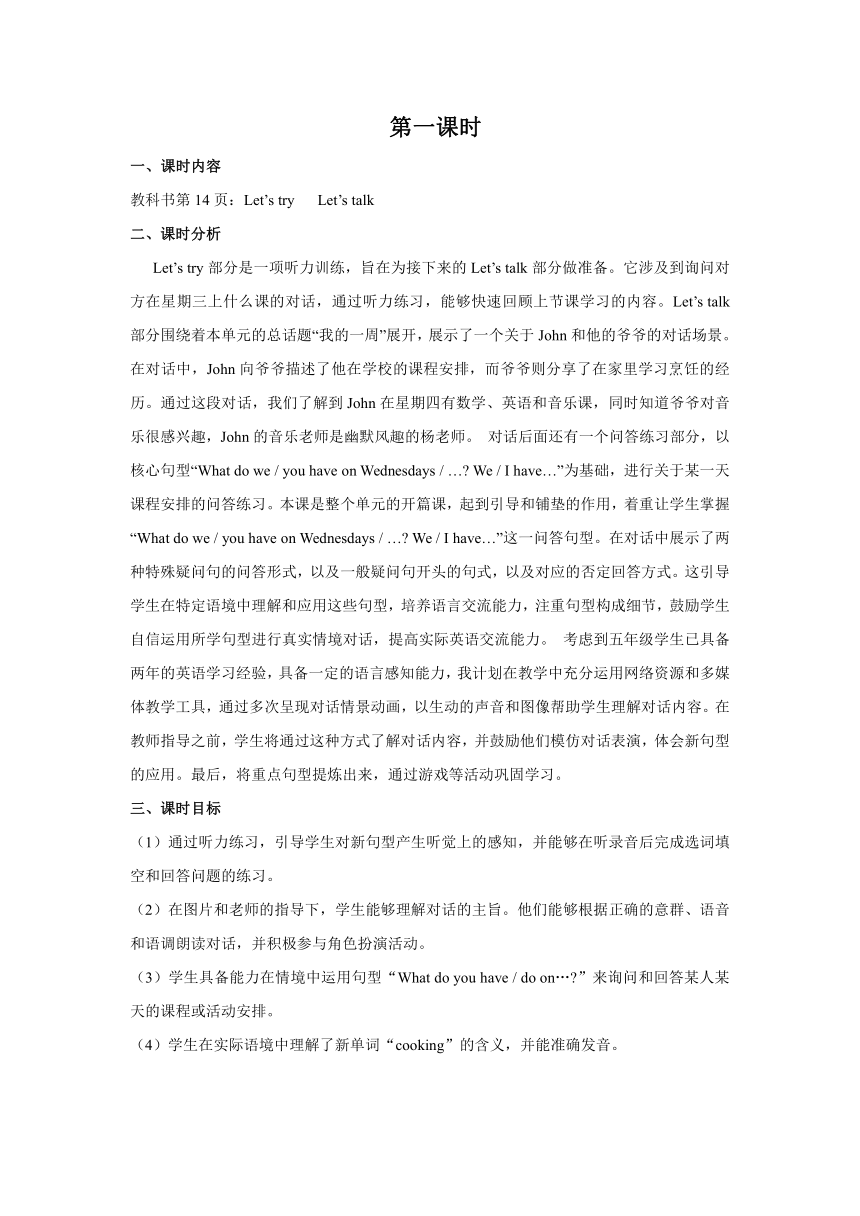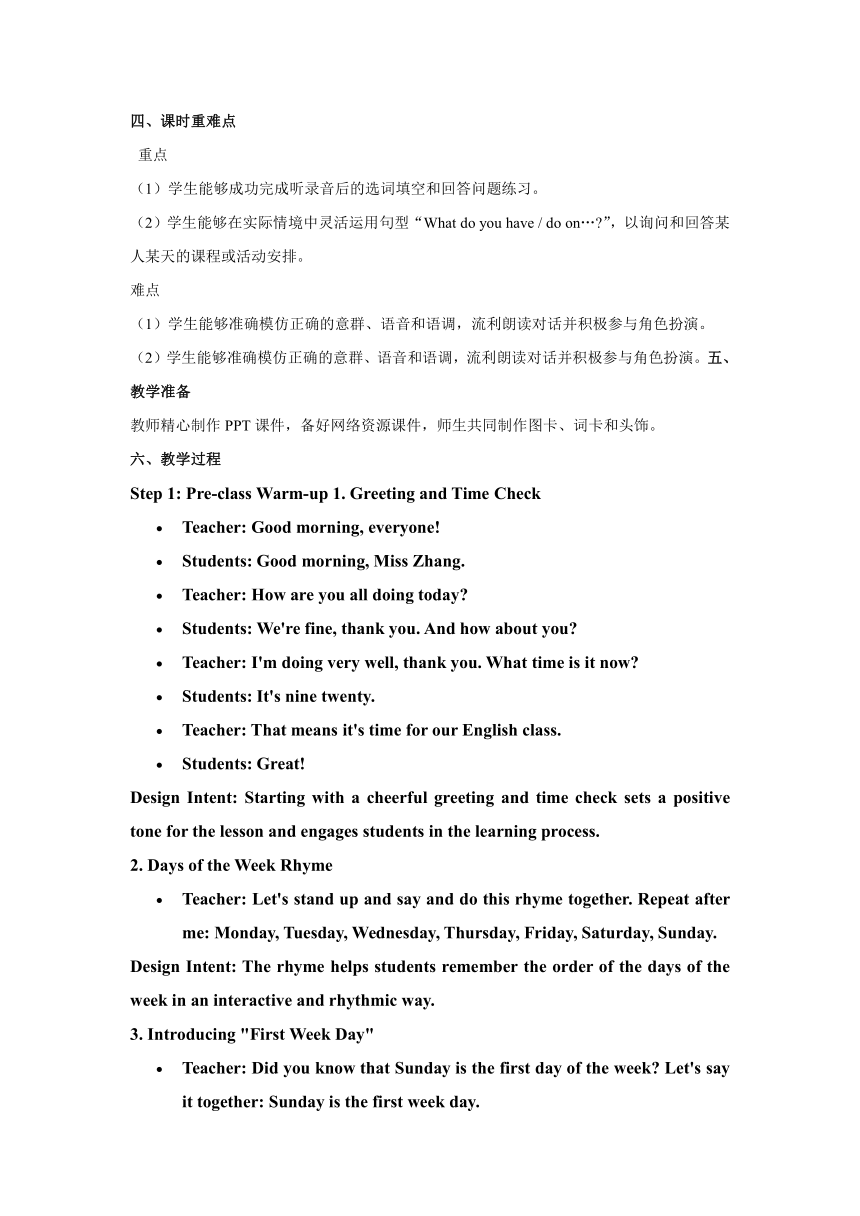Unit 2 My week Part A Let’s try Let’s talk 教案
文档属性
| 名称 | Unit 2 My week Part A Let’s try Let’s talk 教案 |

|
|
| 格式 | docx | ||
| 文件大小 | 25.2KB | ||
| 资源类型 | 教案 | ||
| 版本资源 | 人教版(PEP) | ||
| 科目 | 英语 | ||
| 更新时间 | 2023-08-25 22:31:45 | ||
图片预览


文档简介
第一课时
一、课时内容
教科书第14页:Let’s try Let’s talk
二、课时分析
Let’s try部分是一项听力训练,旨在为接下来的Let’s talk部分做准备。它涉及到询问对方在星期三上什么课的对话,通过听力练习,能够快速回顾上节课学习的内容。Let’s talk部分围绕着本单元的总话题“我的一周”展开,展示了一个关于John和他的爷爷的对话场景。在对话中,John向爷爷描述了他在学校的课程安排,而爷爷则分享了在家里学习烹饪的经历。通过这段对话,我们了解到John在星期四有数学、英语和音乐课,同时知道爷爷对音乐很感兴趣,John的音乐老师是幽默风趣的杨老师。 对话后面还有一个问答练习部分,以核心句型“What do we / you have on Wednesdays / … We / I have…”为基础,进行关于某一天课程安排的问答练习。本课是整个单元的开篇课,起到引导和铺垫的作用,着重让学生掌握“What do we / you have on Wednesdays / … We / I have…”这一问答句型。在对话中展示了两种特殊疑问句的问答形式,以及一般疑问句开头的句式,以及对应的否定回答方式。这引导学生在特定语境中理解和应用这些句型,培养语言交流能力,注重句型构成细节,鼓励学生自信运用所学句型进行真实情境对话,提高实际英语交流能力。 考虑到五年级学生已具备两年的英语学习经验,具备一定的语言感知能力,我计划在教学中充分运用网络资源和多媒体教学工具,通过多次呈现对话情景动画,以生动的声音和图像帮助学生理解对话内容。在教师指导之前,学生将通过这种方式了解对话内容,并鼓励他们模仿对话表演,体会新句型的应用。最后,将重点句型提炼出来,通过游戏等活动巩固学习。
三、课时目标
(1)通过听力练习,引导学生对新句型产生听觉上的感知,并能够在听录音后完成选词填空和回答问题的练习。
(2)在图片和老师的指导下,学生能够理解对话的主旨。他们能够根据正确的意群、语音和语调朗读对话,并积极参与角色扮演活动。
(3)学生具备能力在情境中运用句型“What do you have / do on… ”来询问和回答某人某天的课程或活动安排。
(4)学生在实际语境中理解了新单词“cooking”的含义,并能准确发音。
四、课时重难点
重点
(1)学生能够成功完成听录音后的选词填空和回答问题练习。
(2)学生能够在实际情境中灵活运用句型“What do you have / do on… ”,以询问和回答某人某天的课程或活动安排。
难点
(1)学生能够准确模仿正确的意群、语音和语调,流利朗读对话并积极参与角色扮演。
(2)学生能够准确模仿正确的意群、语音和语调,流利朗读对话并积极参与角色扮演。五、教学准备
教师精心制作PPT课件,备好网络资源课件,师生共同制作图卡、词卡和头饰。
六、教学过程
Step 1: Pre-class Warm-up 1. Greeting and Time Check
Teacher: Good morning, everyone!
Students: Good morning, Miss Zhang.
Teacher: How are you all doing today
Students: We're fine, thank you. And how about you
Teacher: I'm doing very well, thank you. What time is it now
Students: It's nine twenty.
Teacher: That means it's time for our English class.
Students: Great!
Design Intent: Starting with a cheerful greeting and time check sets a positive tone for the lesson and engages students in the learning process.
2. Days of the Week Rhyme
Teacher: Let's stand up and say and do this rhyme together. Repeat after me: Monday, Tuesday, Wednesday, Thursday, Friday, Saturday, Sunday.
Design Intent: The rhyme helps students remember the order of the days of the week in an interactive and rhythmic way.
3. Introducing "First Week Day"
Teacher: Did you know that Sunday is the first day of the week Let's say it together: Sunday is the first week day.
Students: Sunday is the first week day.
Teacher: And the first week day is Sunday.
Students: And the first week day is Sunday.
Design Intent: Reinforcing the concept of the first day of the week as Sunday helps students understand the structure of the week.
Step 2: Introduction 1. Days of the Week Song
Teacher: Who's ready to learn how to talk about different days of the week Let's start with a fun song. Listen and sing along!
Students: Yay!
Design Intent: Introducing a days of the week song brings an element of excitement to the lesson and helps students become familiar with the correct pronunciation of the days.
2. Listening Practice
Teacher: Now, let's practice our listening skills. Listen carefully to the recording and complete the exercise on page 14 of your textbook.
Design Intent: Incorporating listening practice exercises helps students enhance their auditory comprehension and trains them to follow spoken English.
3. Language Introduction
Teacher: Well done! Now, let's dive into our lesson. How about we learn how to talk about Tuesdays
Students: Sounds good!
Teacher: Alright, let's watch a dialogue and pay close attention.
Design Intent: Transitioning smoothly into the core lesson content by introducing the focus of the lesson and engaging students' curiosity.
Step 3: Presentation 1. Watching the Dialogue Animation
Teacher: Watch this animated dialogue between John and his grandfather. Keep an eye out for new words or phrases you're not familiar with.
Design Intent: Using a visual dialogue animation maintains students' engagement and encourages them to actively listen for unfamiliar vocabulary.
2. Clarifying New Vocabulary
Teacher: If you have any questions about the dialogue, feel free to ask me. Let's discuss any new words or phrases you've spotted.
Design Intent: Addressing students' questions and clarifying vocabulary terms helps them understand the dialogue better and builds their confidence.
3. Translating the Dialogue
Teacher: Let's practice translating the dialogue into Chinese to ensure we understand its meaning.
Design Intent: Translating the dialogue allows students to process the content on a deeper level and reinforces their comprehension of the dialogue.
Step 4: Practice 1. Role Play and Group Performance
Teacher: Now, let's practice the dialogue together! Pair up and take turns being John and his grandfather. When you're ready, some groups will perform the dialogue for the class.
Design Intent: Role-playing the dialogue in pairs and group performances encourage active participation and improve students' speaking skills.
2. Sentence Transformation and Creativity
Teacher: Let's change a few things in the dialogue. How about we transform John's schedule to Wednesday instead of Thursday Let's see if you can make the changes.
Design Intent: This activity challenges students to apply the dialogue structure to new contexts, reinforcing their understanding of the sentence patterns.
3. Imaginary Dialogues and Presentation
Teacher: Imagine you're Tom instead of John. Create a dialogue between Tom and his father about Tom's Wednesday schedule. Feel free to make it creative and fun. When you're ready, present your dialogue to the class.
Design Intent: Encouraging students to create their own dialogues using the target structure fosters creativity and adaptability in using English.
Step 5: Review and Conclusion 1. Checking Understanding
Teacher: Let's review the key points. Who can tell me what you've learned in today's class
Students: I learned how to talk about different days of the week and discuss my schedule.
Design Intent: Summarizing the main takeaways from the lesson ensures that students grasp the key concepts and structures introduced.
2. Encouraging Engagement
Teacher: I'm glad you all learned something new today. Keep practicing your English and using it to talk about your schedules and preferences.
Design Intent: Ending the lesson on an encouraging note motivates students to continue using English outside the classroom and reinforces the practicality of the lesson content.
板书设计
Unit 2 第一课时
重点单词:Wednesday Thursday cooking
重点句型:What do you have on Thursdays
I have maths, English and music on Thursdays.
What do you do on Thursdays I have a cooking with your grandma.
一、课时内容
教科书第14页:Let’s try Let’s talk
二、课时分析
Let’s try部分是一项听力训练,旨在为接下来的Let’s talk部分做准备。它涉及到询问对方在星期三上什么课的对话,通过听力练习,能够快速回顾上节课学习的内容。Let’s talk部分围绕着本单元的总话题“我的一周”展开,展示了一个关于John和他的爷爷的对话场景。在对话中,John向爷爷描述了他在学校的课程安排,而爷爷则分享了在家里学习烹饪的经历。通过这段对话,我们了解到John在星期四有数学、英语和音乐课,同时知道爷爷对音乐很感兴趣,John的音乐老师是幽默风趣的杨老师。 对话后面还有一个问答练习部分,以核心句型“What do we / you have on Wednesdays / … We / I have…”为基础,进行关于某一天课程安排的问答练习。本课是整个单元的开篇课,起到引导和铺垫的作用,着重让学生掌握“What do we / you have on Wednesdays / … We / I have…”这一问答句型。在对话中展示了两种特殊疑问句的问答形式,以及一般疑问句开头的句式,以及对应的否定回答方式。这引导学生在特定语境中理解和应用这些句型,培养语言交流能力,注重句型构成细节,鼓励学生自信运用所学句型进行真实情境对话,提高实际英语交流能力。 考虑到五年级学生已具备两年的英语学习经验,具备一定的语言感知能力,我计划在教学中充分运用网络资源和多媒体教学工具,通过多次呈现对话情景动画,以生动的声音和图像帮助学生理解对话内容。在教师指导之前,学生将通过这种方式了解对话内容,并鼓励他们模仿对话表演,体会新句型的应用。最后,将重点句型提炼出来,通过游戏等活动巩固学习。
三、课时目标
(1)通过听力练习,引导学生对新句型产生听觉上的感知,并能够在听录音后完成选词填空和回答问题的练习。
(2)在图片和老师的指导下,学生能够理解对话的主旨。他们能够根据正确的意群、语音和语调朗读对话,并积极参与角色扮演活动。
(3)学生具备能力在情境中运用句型“What do you have / do on… ”来询问和回答某人某天的课程或活动安排。
(4)学生在实际语境中理解了新单词“cooking”的含义,并能准确发音。
四、课时重难点
重点
(1)学生能够成功完成听录音后的选词填空和回答问题练习。
(2)学生能够在实际情境中灵活运用句型“What do you have / do on… ”,以询问和回答某人某天的课程或活动安排。
难点
(1)学生能够准确模仿正确的意群、语音和语调,流利朗读对话并积极参与角色扮演。
(2)学生能够准确模仿正确的意群、语音和语调,流利朗读对话并积极参与角色扮演。五、教学准备
教师精心制作PPT课件,备好网络资源课件,师生共同制作图卡、词卡和头饰。
六、教学过程
Step 1: Pre-class Warm-up 1. Greeting and Time Check
Teacher: Good morning, everyone!
Students: Good morning, Miss Zhang.
Teacher: How are you all doing today
Students: We're fine, thank you. And how about you
Teacher: I'm doing very well, thank you. What time is it now
Students: It's nine twenty.
Teacher: That means it's time for our English class.
Students: Great!
Design Intent: Starting with a cheerful greeting and time check sets a positive tone for the lesson and engages students in the learning process.
2. Days of the Week Rhyme
Teacher: Let's stand up and say and do this rhyme together. Repeat after me: Monday, Tuesday, Wednesday, Thursday, Friday, Saturday, Sunday.
Design Intent: The rhyme helps students remember the order of the days of the week in an interactive and rhythmic way.
3. Introducing "First Week Day"
Teacher: Did you know that Sunday is the first day of the week Let's say it together: Sunday is the first week day.
Students: Sunday is the first week day.
Teacher: And the first week day is Sunday.
Students: And the first week day is Sunday.
Design Intent: Reinforcing the concept of the first day of the week as Sunday helps students understand the structure of the week.
Step 2: Introduction 1. Days of the Week Song
Teacher: Who's ready to learn how to talk about different days of the week Let's start with a fun song. Listen and sing along!
Students: Yay!
Design Intent: Introducing a days of the week song brings an element of excitement to the lesson and helps students become familiar with the correct pronunciation of the days.
2. Listening Practice
Teacher: Now, let's practice our listening skills. Listen carefully to the recording and complete the exercise on page 14 of your textbook.
Design Intent: Incorporating listening practice exercises helps students enhance their auditory comprehension and trains them to follow spoken English.
3. Language Introduction
Teacher: Well done! Now, let's dive into our lesson. How about we learn how to talk about Tuesdays
Students: Sounds good!
Teacher: Alright, let's watch a dialogue and pay close attention.
Design Intent: Transitioning smoothly into the core lesson content by introducing the focus of the lesson and engaging students' curiosity.
Step 3: Presentation 1. Watching the Dialogue Animation
Teacher: Watch this animated dialogue between John and his grandfather. Keep an eye out for new words or phrases you're not familiar with.
Design Intent: Using a visual dialogue animation maintains students' engagement and encourages them to actively listen for unfamiliar vocabulary.
2. Clarifying New Vocabulary
Teacher: If you have any questions about the dialogue, feel free to ask me. Let's discuss any new words or phrases you've spotted.
Design Intent: Addressing students' questions and clarifying vocabulary terms helps them understand the dialogue better and builds their confidence.
3. Translating the Dialogue
Teacher: Let's practice translating the dialogue into Chinese to ensure we understand its meaning.
Design Intent: Translating the dialogue allows students to process the content on a deeper level and reinforces their comprehension of the dialogue.
Step 4: Practice 1. Role Play and Group Performance
Teacher: Now, let's practice the dialogue together! Pair up and take turns being John and his grandfather. When you're ready, some groups will perform the dialogue for the class.
Design Intent: Role-playing the dialogue in pairs and group performances encourage active participation and improve students' speaking skills.
2. Sentence Transformation and Creativity
Teacher: Let's change a few things in the dialogue. How about we transform John's schedule to Wednesday instead of Thursday Let's see if you can make the changes.
Design Intent: This activity challenges students to apply the dialogue structure to new contexts, reinforcing their understanding of the sentence patterns.
3. Imaginary Dialogues and Presentation
Teacher: Imagine you're Tom instead of John. Create a dialogue between Tom and his father about Tom's Wednesday schedule. Feel free to make it creative and fun. When you're ready, present your dialogue to the class.
Design Intent: Encouraging students to create their own dialogues using the target structure fosters creativity and adaptability in using English.
Step 5: Review and Conclusion 1. Checking Understanding
Teacher: Let's review the key points. Who can tell me what you've learned in today's class
Students: I learned how to talk about different days of the week and discuss my schedule.
Design Intent: Summarizing the main takeaways from the lesson ensures that students grasp the key concepts and structures introduced.
2. Encouraging Engagement
Teacher: I'm glad you all learned something new today. Keep practicing your English and using it to talk about your schedules and preferences.
Design Intent: Ending the lesson on an encouraging note motivates students to continue using English outside the classroom and reinforces the practicality of the lesson content.
板书设计
Unit 2 第一课时
重点单词:Wednesday Thursday cooking
重点句型:What do you have on Thursdays
I have maths, English and music on Thursdays.
What do you do on Thursdays I have a cooking with your grandma.
